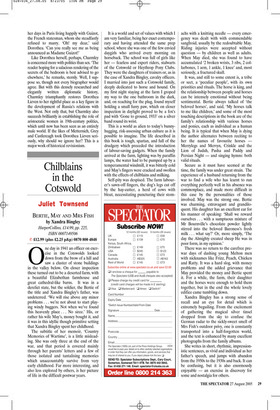Chilblains in the Cotswold
Juliet Townsend
BERTIE, MAY AND MRS FISH by Xandra Bingley HarperCollins, £14.99, pp. 225, ISBN 0007149506 V £12.99 (plus £2.25 p&p) 0870 800 4848 One day in 1941 an officer on exercise in the Cotswolds looked down from the brow of a hill and saw a cluster of stone buildings in the valley below. On closer inspection these turned out to be a deserted farm, with a beautiful Elizabethan farmhouse and great cathedral-like barns. It was in a derelict state, but the soldier, the Bertie of the title and Xandra Bingley’s father, was undeterred. ‘We will rise above any minor problems ... we’re not about to start playing windy buggers. Not when we’ve found this heavenly place ... No siree.’ His, or rather his wife May’s, money bought it, and it was in this idyllic though primitive setting that Xandra Bingley spent her childhood.
The subtitle of her memoir, ‘Country Memories of Wartime’, is a little misleading. She was only three at the end of the war, and that period is covered mainly through her parents’ letters and a few of those isolated and tantalising memories which unaccountably survive from very early childhood. Far more interesting, and also less explored by others, is her picture of life in the difficult postwar years. It is a world and set of values with which I am very familiar, being her exact contemporary and having attended the same prep school, where she was one of the few envied daygirls who arrived every morning on horseback. The school was full of girls like her — fearless and expert riders, stalwarts of the Cotswold or Heythrop Pony Clubs. They were the daughters of trainers or, as in the case of Xandra Bingley, cavalry officers. I married into just such a Cotswold family, deeply dedicated to horse and hound. On my first night staying at the farm I groped my way to the one bathroom in the dark, and, on reaching for the plug, found myself holding a small furry paw, which on closer inspection in daylight proved to be a fox’s pad with ‘Gone to ground, 1933’ on a silver band round its wrist.
This is a world as alien to today’s bunnyhugging, risk-assessing urban culture as it is possible to imagine. The life described in this book is tough, spartan, and full of the drudgery which preceded the introduction of labour-saving gadgets. When the family arrived at the farm, lighting was by paraffin lamps, the water had to be pumped up by a temperamental windmill, it was bitterly cold and May’s fingers were cracked and swollen with the effects of chilblains and milking.
Self-pity was despised. The farm labourer’s sawn-off fingers, the dog’s legs cut off by the hay-cutter, a herd of cows with bloat, necessitating puncturing their stom achs with a knitting needle — every emergency was dealt with with commendable sangfroid, usually by the redoubtable May. Riding injuries were accepted without question — by children as well as adults. When May died, she was found to have accumulated ‘2 broken wrists, 3 ribs, 2 collarbones, 1 arm, 1 ankle, 1 knee’ and, most seriously, a fractured skull.
It was, and still to some extent is, a tribe or sect, a ‘peculiar people’, with its own priorities and rituals. The horse is king, and the relationship between people and horses can be intensely emotional without being sentimental. Bertie always talked of ‘the beloved horses’, and said, ‘My horses talk to me like children,’ and some of the most touching descriptions in the book are of the family’s relationship with various horses and ponies, each as individual as a human being. It is typical that when May is dying the author alternates between reciting to her the names of favourite horses Merrylegs and Mervyn, Crinkle and the Lion of Judah, Pasha and Paddy and Persian Night — and singing hymns: both valid rituals.
Secure as it must have seemed at the time, the family was under great strain. The experience of a husband returning from the war to find a wife who has learnt to run everything perfectly well in his absence was commonplace, and made more difficult in this case by the personalities of those involved. May was the strong one. Bertie was charming, extravagant and grandiloquent. His daughter has an excellent ear for his manner of speaking: ‘Shall we reward ourselves ... with a sumptuous mixture of Mr Bournville’s chocolate powder lightly stirred into the beloved Baroness’s fresh milk ... what say?’ Or, more simply, ‘The day the Almighty created sheep He was in poor form, in my opinion.’ There was no return to the carefree prewar days of dashing young Melton men with nicknames like Frizz, Peach, Chicken and Ratty. It was a hard slog, with money problems and the added grievance that May provided the money and Bertie spent it. For a while, the farm, their daughter and the horses were enough to hold them together, but in the end the whole lovely edifice came tumbling down.
Xandra Bingley has a strong sense of recall and an eye for detail which is extremely beguiling. From the excitement of gathering the magical silver tinsel dropped from the sky to confuse the German radar to the sickly-sweet smell of Mrs Fish’s outdoor privy, one is constantly transported into a half-forgotten world, and the text is enhanced by many excellent photographs from the family albums.
She writes in short, rhythmic, impressionistic sentences, as vivid and individual as her father’s speech, and jumps with abandon from the 1950s to the 1930s and back. It can be confusing, but it is also enormously enjoyable — an exercise in discovery for some and nostalgia for others.











































 Previous page
Previous page